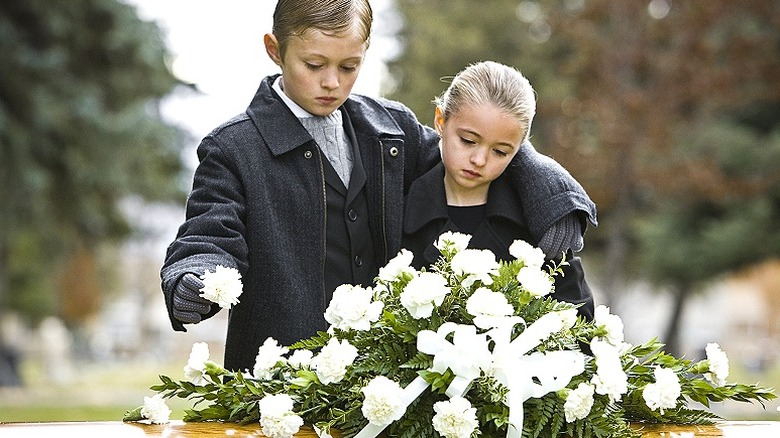The Age You Should Be Aware Of To Claim Survivor Benefits
In retirement, every penny counts, and no more so than when your household income is split between two people. As a couple, the loss of a spouse can come with personal and financial challenges that can be often unexpected — you may be responsible for your deceased spouse's debts, for instance — and the loss of a loved one may also represent the significant loss of household income. Fortunately, Social Security offers a form of insurance against the financial challenges of this scenario with survivor benefits.
Survivor benefits are partially funded by Social Security taxes and often pay out more than individual life insurance over the long term. The longer you work, the more credits you build up toward this benefit, although regardless of your age when you die or how long you've been working, this benefit will still be paid out to surviving family — specifically, a spouse or ex-spouse, and dependents, including children and parents.
Depending on the length of time you're in the workforce when you die, your beneficiaries could also be eligible for a one-time lump sum payment ($255) in addition to regular benefit payments. However, it's not just the age of the deceased in these situations that matter, but also the age of the surviving beneficiaries. For surviving spouses, that age is 60.
Social Security survivor benefits for spouses
Sixty years old is the age at which spouses without dependents can begin collecting survivor benefits. However, taking the benefits at that age would mean a reduced benefit, not unlike how taking Social Security benefits earlier than full retirement age (67 years old for anyone born in 1960 or after) will lower the amount the living are paid out. As a surviving spouse, if you were in a financial position to wait until your full retirement age, you could then collect full survivor benefits from Social Security.
It's up to you and your personal situation to determine whether it makes sense to claim survivor benefits immediately, or to hold off for a higher amount. At age 60, for example, you'd receive 71.5% of the benefit, with this amount increasing every two years beginning at age 61. If you wait until age 61, you'd receive over 75% of the benefit, while waiting until age 63 will result in over 80%. At age 65, the reduced benefit goes up to 90%, and at full retirement age, you'd receive 100%.
Social Security provides a benefits calculator to help determine the amount you would be eligible for. Assuming a birth date of October 1, 1964, at 60 years old without a disability, your annual benefit would be $22,320 per year, representing 71.5% of your spousal benefit. In short, waiting is one of the ways to drastically increase your Social Security benefits.
Other age rules for survivor benefits
While 60 years old is the earliest a spouse without dependents can claim survivor benefits, there are exceptions. If the surviving spouse or ex-spouse has a disability, they're eligible to claim survivor benefits beginning at 50 years old. Social Security deems a disability to be a physical, neurological, or psychological issue leading to an inability to hold down gainful employment that will likely limit your life expectancy; the issue is also expected to impact you for at least 12 months. Blindness is its own special category with increased payout and earnings limit of $2,590 per month.
If your surviving spouse or ex-spouse is the primary caregiver of a child under 16 years old or with a disability — regardless of their age — they're also eligible to claim survivor's benefits under Social Security, so long as the child is also getting Social Security. Although children can receive 75% of the parental benefit, there's a family cap or maximum on how much each household can claim. Where ex-spouses are concerned, Social Security deems them eligible for survivor benefits if you were married at least 10 years.
Something else to note is there's no time limit for claiming survivor benefits for a spouse, although there is a time limit when it comes to claiming on behalf of your children, which is typically until their 18th birthday. You also can't collect both survivor benefits and retirement benefits, but Social Security will automatically send you the higher amount of the two.


